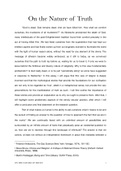Essay
Essay over de betekenis van 'waarheid'
- Course
- Institution
Dit essay gaat over wat het in de meest fundamentele zin betekent voor iets om 'waar' te zijn. Vaak wordt gedacht dat louter wetenschappelijke inzichten als zodanig bestempeld dienen te worden, maar ik beargumenteer dat hier nog een laag onder zit die dingen werkelijk tot waar maken in de vorm van ...
[Show more]



